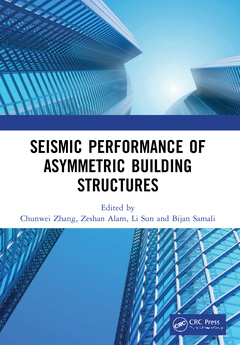Seismic Performance of Asymmetric Building Structures

Seismic Performance of Asymmetric Building Structures presents detailed investigations on the effective assessment of structural seismic response under excessive torsional vibrations, demonstrating behavioural aspects from local response perspective to global seismic demands. The work provides comprehensive analytical, computational, experimental investigations, and proposes improved design guidelines that structural engineers can utilize to enhance the seismic design of asymmetric building structures.
Combining extensive experimental and numerical data stock for seismic performance assessment with a particular focus on asymmetric building structures, the book includes:
? An overview of asymmetric building structures from seismic damage perspective
? Local and global performance assessment of asymmetric structures under extreme seismic actions
? Post-earthquake damage evaluation from varying frequency trends
? Extended numerical applications for experimental response validations
? Evaluation of critical regions of asymmetric structure with stress concentration
? Statistical distribution of seismic response under varying design parameters
? Design guidelines for asymmetric building structures
This work's comprehensive evaluations are carried out with modern sensing techniques planned with meticulous attention to cover objectives with a particular focus on asymmetry in reinforced concrete and steel structures. It assesses various aspects of asymmetric building structures that are rarely dealt with in the current literature. It gathers fruitful information from various building design codes and explains their limitations in addressing damage-related challenges, which is not only useful for practicing engineers but also for academics.
The book will be invaluable for experts, researchers, students and practitioners from relevant areas, as well as for emergency preparedness managers.
1 Introduction to the Seismic Performance of Asymmetric Building Stuctures, 2 A Review of Research on Design Guidelines and Seismic Performance of Asymmetric Building Structures, 3 Experimental Strategy and Seismic Loading Program, 4 Damage Response Investigation of Asymmetric Building Structures, 5 Numerical Evaluation of Complex Local Behavior, 6 Global Seismic Behaviour of Asymmetric Building Structures, 7 Influence of Design Parameters on the Statistical Distribution of Structural Response, 8 Seismic Design Guidelines for Asymmetric Building Structures, 9 Conclusions, Appendices.
Chunwei Zhang obtained his PhD degree from Harbin Institute of Technology in 2005. From 2005 to 2007, he was a research associate in Harbin Institute of Technology; From 2007 to 2010 he was an Assistant Professor at Harbin Institute of Technology. From 2010 to 2015, he was a senior lecturer at Western Sydney University. He is currently a Professor at Qingdao University of Technology and Director of the Structural Vibration Control group. He has also served as the Secretary-general for the Young Researcher's Forum at the 14th World Conference on Earthquake Engineering, and as committee member of the Dynamics and Control Division of American Society of Civil Engineer (ASCE). He has been in charge of and has participated in several major research programs, including general projects from National Science Foundation of China (NSFC), Key Technology R&D and 863 discovery and 973 major fundamental programs from Ministry of Science and Technology of China as well as industry grants etc. He was also the external assessor for National Science Foundation of China. His research interests include structural control, blast resistance and protective engineering. He has been awarded the first grade prize for Science and Technology Progress in 2009 by China Ministry of Education, and the Japan Society of Seismic Isolation (JSSI) award in 2004, and the best paper award for the eleventh international symposium on Structural Engineering.
Zeshan Alam obtained his Bachelor’s Degree in 2010 from the University of Engineering and Technology, Peshawar, Pakistan and his Master’s degree in Structural Engineering in 2012 from the National University of Sciences and Technology, Pakistan. He is currently a PhD candidate at the Centre for Infrastructure Engineering at Western Sydney University, Australia and a visiting research fellow at Qingdao University of Technology, China. His research interests are Earthquake Engineering and Structural Dynami
Date de parution : 08-2022
17.4x24.6 cm
Date de parution : 05-2020
17.4x24.6 cm
Thèmes de Seismic Performance of Asymmetric Building Structures :
Mots-clés :
Seismic Excitation; Seismic Response; structural engineering; FBG Sensor; civil engineering; Asymmetric Structures; seismic engineering; RC Model; seismic performance; Inter-story Drift; post-earthquake damage evaluation; Top Roof Level; asymmetric building structures; Stiffness Eccentricities; seismic loading program; Acceleration Response; Residual Strain; FBG Strain Sensor; Seismic Design Guidelines; Torsional Vibrations; Inelastic State; Neutral Axis; Plastic Hinges; Input Ground Motion; TS Structure; Tensile Strain; Seismic Design; Strength Eccentricity; Shear Wall; Response Quantities; Top Floor Level; Drift Response



